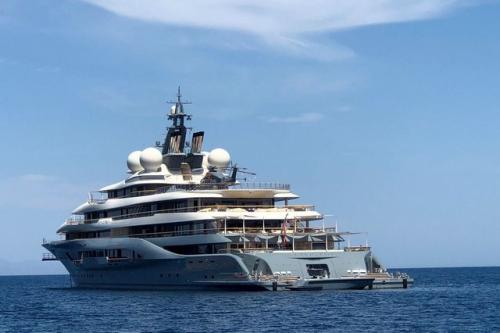Revulsion against billionaire wealth isn’t about “envy.” It’s about democracy
We can either reign in the transnational power of the global superrich or let them bulldoze whatever remains of the public sphere, the commons, and the democratic state.
- Opinión

Rotterdam has been forced to walk back the dismantling of a historic bridge to make way for Jeff Bezos’s superyacht. But the incident is a reminder that billionaires’ obscene wealth isn’t just about hoarding resources — it’s also about undermining democracy.
Last week, various media outlets reported the horrifying news that the Dutch city of Rotterdam was planning to temporarily dismantle its historic Koningshaven Bridge to allow the superyacht owned by Amazon founder Jeff Bezos to pass through. Even for those outside the Netherlands unfamiliar with the bridge or its significance as a national monument there, the news carried an unavoidable symbolism: a historic piece of public infrastructure set to be maimed to make way for a gaudy billionaire pleasure vehicle owned by the world’s second richest man — a development, no less, owed to the boat’s sheer physical size relative to the bridge. The political cartoons practically draw themselves.
Rotterdam has, for what it’s worth, since appeared to walk back the plan in the face of public outcry. Summing up the spirit of the opposition, author Siebe Thissen told the New York Times:
It’s a monument. It’s the identity of Rotterdam. I think that’s why there is so much turmoil about Jeff Bezos and his boat. People say, “Why this guy?” It’s a working-class town, and they all know that Jeff Bezos, of course, he exploits his workers, so people say, “Why should this guy be able to demolish the bridge for his boat?”
Thousands of Dutch citizens meanwhile threatened to pelt the boat with rotten eggs if the city’s original plan goes through. While that plan now seems to be in limbo, it remains unclear exactly how Bezos plans to take his so-called superyacht — currently under construction in the Netherlands — out to open sea, or what else might have to be dismantled as a result. As it stands, however, residents of Rotterdam opposed to the bridge’s dismantling look to have scored a small but real victory for local democracy over one of the globe’s most visible symbols of plutocracy.
Still, the whole episode is a good occasion to reassert the simple democratic case against allowing anyone to amass a billion dollars, let alone the nearly $200 billion currently held by Jeff Bezos. Though right-wing apologists for extreme wealth have long been quick to lob accusations of “envy” at its left-wing critics, Bezos is himself a particularly illustrative case study in what the nature of the left’s critique actually is.
Being a billionaire, after all, doesn’t just give you the ability to buy luxury products, expensive property, and an excess of “stuff.” Wealth on this scale inevitably translates into power: to advance (or help agitate against) particular political causes; to influence or control major investment decisions; to transcend national borders and avoid tax; to indulge personal hobbies on a scale that potentially threatens national monuments and historic infrastructure; to own large chunks of the world economy; and to quite literally bend society around your own wants, needs, and interests.
In Bezos’s case, owning a 10 percent stake in the world’s largest company also comes with a considerable mandate to shape the lives of millions of his fellow human beings. As Grace Blakeley writes:
[Bezos] can influence what wages Amazon sets, which determines the incomes of millions of people all over the world. He can shape the investment decisions the company makes, which not only determine how many jobs will be created in the economy, but also the kinds of goods, services and technologies that are likely to be developed in the coming years. He can input into a whole range of decisions that have a massive impact on the rest of society — from the company’s environmental footprint to its total tax liability.
Resisting an economic order that enables a tiny few to accrue so much power thus has nothing to do with envy and everything to do with democracy. In the twenty-first century, we can either reign in the transnational power of the global superrich or let them — literally and figuratively — bulldoze whatever remains of the public sphere, the commons, and the democratic state.
https://jacobinmag.com/2022/02/billionaires-superrich-envy-rotterdam-bridge-superyacht-democracy
